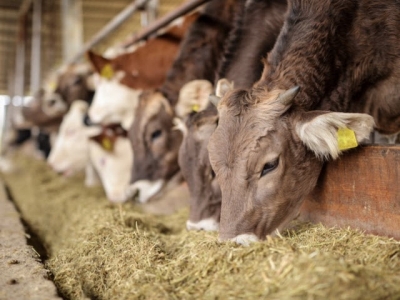Dairy research seeks to improve protein, nitrogen efficiency

A dairy nutrition researcher is seeking to design more efficient dairy diets to reduce the amounts of crude protein needed and nitrogen lost while supporting production.
We caught up with Sebastian Arriola Apelo, assistant professor in the department of dairy science at the University of Wisconsin-Madison to hear more about his work. Photo: GettyImages/Ljupco
He is focused on dietary nitrogen efficiency and reduction of nitrogen excretion from dairy production systems through the understanding of milk protein synthesis regulation by amino acids. With that knowledge he wants to improve current nutrient requirement systems for lactating dairy cows.
A better understanding of the biology involved when a cow turns feed protein into milk might change how future diets are formulated, he said.
“The problem the current requirement system has is that it considers the proteins as a whole, not the individual amino acids that are the building blocks of the protein,” he said.
Optimization of dairy ration formulations is of interest for many stakeholders due to increasing concern about related environmental and economic challenges, he said. The US public has been vocal about the impact of large dairy facilities on regional water quality, he added.
“Compared with other species we currently do a fairly poor job in the use of nitrogen,” he said. “It shouldn’t be like that – after the feed passes the rumen, the biology after that is very similar, almost the same [as monogastrics] – we shouldn’t see any difference in efficiencies [when comparing dairy with poultry or pig production].
However, the biological processes involved still are not completely understood, he said.
“When fed to meet the metabolizable protein (MP) requirements of the US National Research Council (NRC), dairy cows consume an excess of nitrogen, resulting in approximately 75% of dietary nitrogen being lost to the environment as urine and feces.” Source: Arriola Apelo et al (2014)
Nitrogen efficiency
A review of nitrogen efficiency by Arriola Apelo and colleagues found using essential amino acid supplementation and a low CP diet could improve nitrogen efficiency in US dairy systems by more than 30%, and would have the effect of reducing nitrogen excretion by about 92,000 tons annually.
In a related study the researchers found that by including individual essential amino acids (EAA) requirements in absolute terms a reduction in current NRC dietary CP levels may be achieved, while supplementing with specific EAA known to stimulate milk protein synthesis may give maximum nitrogen postabsorptive efficiency for milk protein.
On the economic side, it is too early to establish how much a dairy producer could potentially save from using re-formulated diets as there are still too many unknown variables, he said.
“We first want to understand the biology before we have any recommendations.”
New research aimed at improving the understanding of the biological pathways involved is using a series of tools including a mice model, said Arriola Apelo. “It’s a limited model for dairy efficiency research, but it allows us to use a genetic approach,” he added.
“We can mutate proteins, delete proteins in a mouse and see what effect they have,” he said. “We use a mouse model to better understand the mammary biology,” he said.
They will also rely on tools such as cells in an in vitro culture to help establish parameters for the equations used, he added.
“Using genetic and analytical approaches as well as in vitro allows us to go much farther and once we describe special amino acids we’ll take it to the correct model, which is the dairy cow.”
Related news
 How to select a top-performing beef cow
How to select a top-performing beef cow In the first article of this two-part series, he addresses the selection criteria for a successful beef breeding cow.
 Heat-stressed dairy cows may see some benefits from yeast supplements
Heat-stressed dairy cows may see some benefits from yeast supplements Supplementing heat-stressed dairy cows with yeast cultures may improve feed efficiency and reduce body temperatures, say researchers.
 How to raise Boer Goat kids
How to raise Boer Goat kids Boer Goat kids demand care and management for the first few weeks after birth. If you fail to look after them properly during this important stage